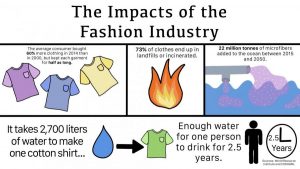Upon divulging I am a math major to unsuspecting passersby, I am most frequently asked “what do you plan to do with that?” There typically are two possible reasons behind this: (1) they know the diversity of mathematics and are actually interested to know how I’ll choose to use it or (2) they think I’ll have to be a teacher. I will be speaking to the first crowd, not because I plan to use the mathematics of sustainability as a career path, but because it is relevant to understand the mathematics behind the science side of sustainability.

This topic can be further broken down into two different sections: the academic/ research side, as well as the personal side applicable to us all. The academic side is of greater interest to me, in part for the diversity of topics that can be researched, but I will also try and touch on how to use (very simple) math in your daily life. The most apparent usage would come in terms of climate change, for which SustainabilityMath is a great resource. Their compilation of calculus and statistics-based concepts provides an easy introduction to how math is being used to better our planet in climate and social justice. The CODEE journal publication on differential equations does a good job of highlighting the numerous ways that can be accomplished. From climate change to technology to political science, the use of differential equations and understanding of how change occurs is being utilized to combat social inequity and sustainability. In addition to descriptive uses where math models real-world problems, it can also be used to increase efficiency. A famous problem in optimization is known as the traveling salesman problem (TSP). Given a series of points, what is the shortest distance an individual can travel in order to reach every location and return back to the starting point. Companies such as Amazon and UPS have interests in such problems as a cost-saving measure, however are also helping with sustainability as cars on a shorter route save emissions. Whenever you plug a destination into a map app on your phone, it’s helping save gas as compared to you trying to determine the route on your own. In addition to these purely academic settings, there is also sustainability in the way we teach math, by focusing less on the numbers and problem solving and more on what it can solve. A blog by the American Mathematical Society explains both these concepts nicely, in addition to better planning regarding the arrangement of academic events that require travel for their participants.

A few of you, our lovely readers, may be able to use the aforementioned ideas. Most will not. Instead, I pose to you that you can use math in your daily life to increase your sustainability. Since most people hate math, I am not asking you to sit down and “crunch the numbers.” Instead, for instance, look at how much you can store of a certain product in your residence to decrease how often you need to go out to get it. It’s even better if you can go to multiple locations in the same trip instead of driving back and forth from your home, and also more convenient! In general, anything in your life that uses materials or effort of any sort can be better optimized through sustainability. While I cannot anticipate all these ways, it isn’t too difficult to sit down and think through it!
https://sustainabilitymath.org/
https://scholarship.claremont.edu/cgi/viewcontent.cgi?referer=&httpsredir=1&article=1048&context=codee

